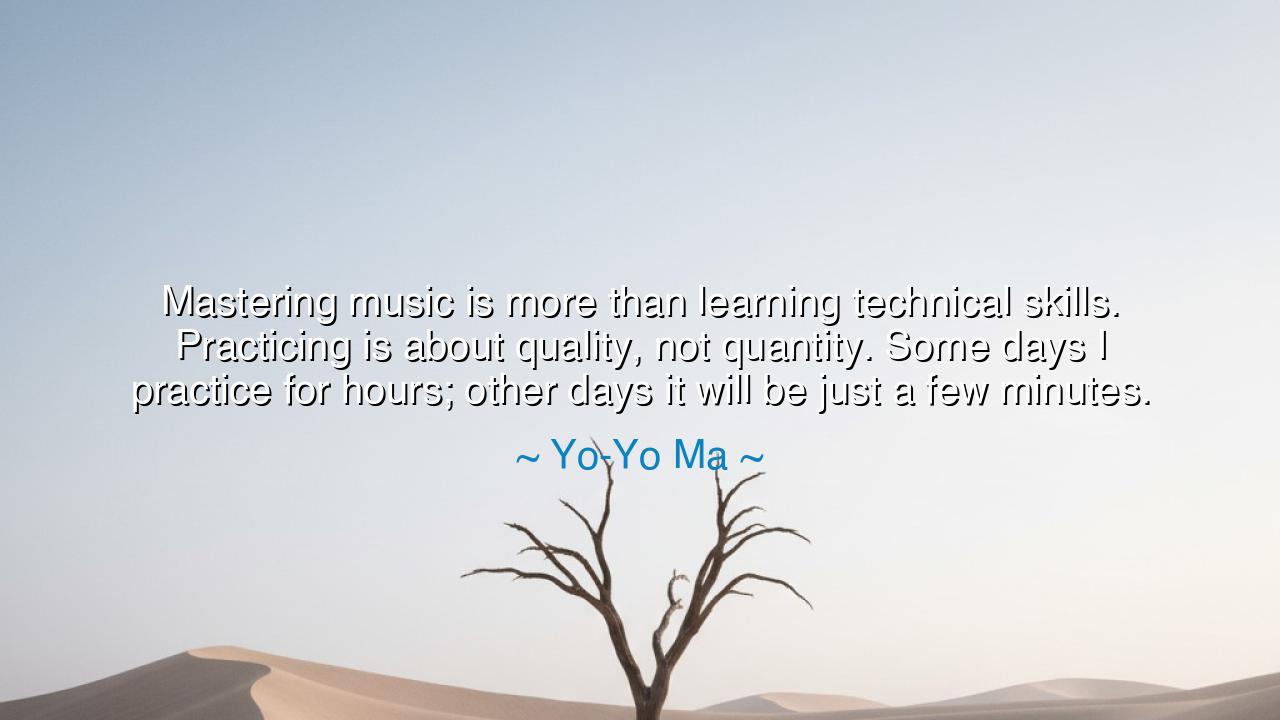
Mastering music is more than learning technical skills.
Mastering music is more than learning technical skills. Practicing is about quality, not quantity. Some days I practice for hours; other days it will be just a few minutes.






In the profound words of Yo-Yo Ma, a master of both music and humanity, we hear a truth that reaches far beyond the realm of art: “Mastering music is more than learning technical skills. Practicing is about quality, not quantity. Some days I practice for hours; other days it will be just a few minutes.” These words, spoken by one who has spent his life in devotion to the language of sound, reveal that true mastery is not a matter of endless repetition, but of presence, intention, and soul. The musician’s path, like the path of wisdom, is not measured by how long one walks, but by how deeply each step is taken.
In this reflection, Yo-Yo Ma reminds us that technique is but the vessel through which meaning flows. A musician may play a thousand notes and yet say nothing, while another may play a single phrase and move hearts to tears. To master music is not to perfect one’s fingers, but to open one’s heart—to understand that art is not built upon endurance alone, but upon attention. When he speaks of practicing for hours one day and only minutes the next, he is teaching us that discipline must serve understanding, not dominate it. The wise artist listens to the rhythm of both his mind and spirit, knowing that progress arises not from force, but from harmony.
From the dawn of civilization, the ancients have known this truth. The samurai, in their code of Bushido, trained not only in the art of the sword but in the art of stillness. They believed that to strike well, one must first calm the soul. Likewise, the Greek philosophers taught that moderation and awareness are the foundations of excellence. Yo-Yo Ma’s philosophy mirrors these timeless principles: to learn deeply, one must listen inwardly. Practice is not a race to accumulate hours, but a sacred dialogue between the learner and the craft. Every note, every breath, every gesture must be alive with purpose.
Consider the story of Ludwig van Beethoven, whose deafness would have ended the journey of a lesser soul. Unable to hear the very music he composed, he turned inward and found sound within silence. In his final symphonies, written when he could hear nothing at all, there is a spiritual power beyond technique—a mastery that transcends the physical. Beethoven could no longer rely on practice in the conventional sense, yet he continued to evolve, proving that true mastery comes not from the hands alone, but from the depths of understanding. His art, born of struggle, teaches the same lesson that Yo-Yo Ma imparts—that greatness is not in how much we do, but in how deeply we feel and how truly we know.
When Yo-Yo Ma says that practicing is about quality, not quantity, he calls us to mindfulness. To practice with quality is to be present in every moment—to let the mind be as focused as the bow upon the string, the heart as tuned as the instrument itself. A single hour of such practice can achieve more than ten hours of distraction. The world today praises constant motion and endless labor, but the master knows that stillness and reflection are as vital as effort. The true student learns not to measure progress by time, but by transformation—by how each note, each act of practice, refines the soul as well as the skill.
There is, within these words, also a message of balance. Some days call for long hours of labor, when the body and mind are eager for challenge. Other days call for silence, rest, or contemplation. To ignore this natural rhythm is to fall into exhaustion and lose the joy of creation. Yo-Yo Ma’s wisdom lies in recognizing that art, like nature, moves in cycles—there is a season for intense growth, and a season for quiet renewal. To push endlessly is to forget that music, like life, breathes through contrast—between sound and silence, motion and pause, effort and peace.
So, O seeker of excellence, learn this: whatever your craft may be—music, writing, labor, or life itself—do not mistake quantity for mastery. Be as Yo-Yo Ma teaches: practice with intention, work with awareness, and let every act, no matter how small, be filled with meaning. When you study, do so not to finish, but to understand. When you practice, do so not to perform, but to become. And when the time comes to rest, rest without guilt, knowing that even silence is part of the song.
For in the end, mastery is not about conquering the craft—it is about being transformed by it. As Yo-Yo Ma reminds us, the truest music flows not from perfect skill, but from a heart that listens. Let your practice, then, be your meditation; your learning, your philosophy. Seek not endless motion, but endless growth. In this way, every note you play—whether in sound or in silence—will echo with the fullness of a life lived in harmony with both art and truth.






AAdministratorAdministrator
Welcome, honored guests. Please leave a comment, we will respond soon